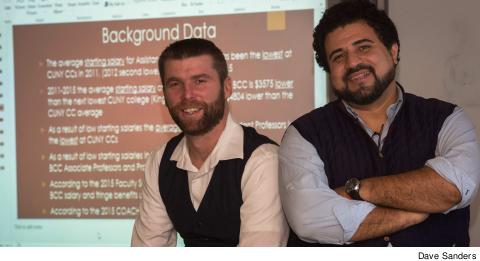PSC members at the Bronx Community College chapter have long suspected their faculty salaries were low, but they just couldn’t prove it. In 2015, members took it upon themselves to look into the matter and found that average salaries for assistant professors at the college were more than $4,800 below the average salary of their colleagues with the same title at CUNY’s other community colleges, according to CUNYfirst salary data from 2011 to 2015.
 |
Armed with that information, PSC activists took action and organized around what they saw as an equity issue – and they won.
DOING THE HOMEWORK
At a November 29 labor-management meeting, Bronx Community College President Thomas Isekenegbe announced that one of the chapter’s proposals – a two-step increase when a faculty member is promoted from assistant professor to associate professor – was approved.
“I think we were able to persuade the president on this because we did our homework, came armed with data going back five years, and were very persistent for five labor-management meetings spanning over a year,” said Peter Kolozi, a PSC delegate who spearheaded the effort. “[We] used the issue, the data and the presentation as an organizing tool to activate, mobilize and attract new members to the chapter.”
Before the announcement of the two-step increase, an assistant professor who was promoted to associate professor at the college was eligible to receive only a one-step increase. The additional salary step, which is near $3,000, aims to reduce the pay gap between BCC faculty and their colleagues at other CUNY community colleges. Isekenegbe said the policy change was already retroactively applied for promotions in Spring 2016 and will be effective for Spring 2017, according to the minutes from the November 29 labor-management meeting. Low salaries have been a long-standing issue at the college, and the PSC chapter organized successfully around the issue more than 10 years ago, ultimately getting the administration to raise starting salaries and grant salary steps at promotion instead of lateral movements, according to Andrew McInerney, a past member of the chapter’s executive committee. But those remedies were not enough.
In the five years of salary data (from 2011 to 2015) that Kolozi analyzed and presented to the administration, BCC ranked last in average salaries for assistant professors for all of the years, except 2012, in which Kingsborough Community College ranked last. But ultimately, BCC was at the bottom of the pack with an average salary near $59,700 for the five years of salary data, compared to an average salary at other CUNY community colleges around $64,500.
Marianne Pita, the PSC grievance counselor at Bronx Community College, said the two-step solution is an effort to pay “catch up” and that the root of the problem is BCC’s low starting salary.
“Salary is a very big issue here,” said Pita, a 20-year veteran of the English department. “We have been over and over at the bottom in terms of ranks.”
She told administration officials at the labor-management meeting how low salaries make it difficult to recruit full-time black and Latino faculty, and urged that something must be done to adjust the starting salaries at the college.
LOW MORALE
For faculty already working at the college, low salaries mean low morale, Kolozi said. Fifty percent of faculty surveyed found BCC’s salary and fringe benefits unsatisfactory, and more than a quarter of faculty surveyed marked compensation as one of the two worst aspects of working at the college, according to recent faculty satisfaction surveys. Kolozi and other chapter activists organized around the issue. Members presented on this pay issue at chapter meetings, created a subcommittee, reached out individually to other members, developed a PowerPoint presentation and persistently pressed their case with administration.
EXPECTATIONS
Jawied Nawabi, as an assistant professor who worked on the subcommittee with Kolozi, said their victory didn’t happen overnight. They kept bringing up the issue to management, and management kept on saying they were reviewing the issue.
“We thought it was going to be another, ‘Let me look at it,’” Nawabi said referring to the late November labor-management meeting. “When you’ve been turned down so many times, you sort of become cynical. [This win] breaks down that cynicism.”
Nawabi said the boost is a step in the right direction, and for junior faculty who are still paying off student loans, the several thousand dollar increase makes a difference. In order to attract and retain talent, salaries must be competitive, said Nawabi. Chapter activists are beginning to look into other issues, including how HEO salaries at the college compare to other community colleges and addressing the root of the salary inequity: low salaries upon hiring. Nawabi said he’s happy that the administration provided one remedy to BCC’s low salaries.
“It feels like you can get more wins. You get the sigh of relief that if you show facts, people listen,” said Nawabi, who has been active with the union since 2014 and plans to continue to organize. “It gives us confidence to look into other matters.”

